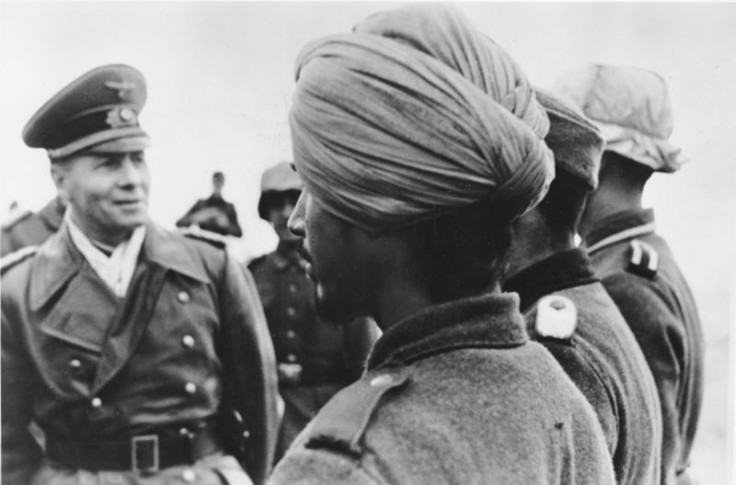Dear Sikh Temple Shooter, Some Indians Actually Fought For Hitler And Nazi Germany
ANALYSIS

Wade Michael Page, the man who killed six worshippers and injured three others at a Sikh temple in a massacre in Wisconsin on Sunday, reportedly sympathized with neo-Nazism and even performed in “white power” bands.
It is unclear if Page mistook the turbaned Sikhs for Muslims and wanted to punish them for their "culpability" in the 9/11 terrorist attacks from 2001, or if he was targeting Sikhs themselves, or perhaps anyone who looked “foreign” to him.
However, Page (who himself was killed by police during the shootout) might have been surprised to learn that many Indians (including a large number of Sikhs) actually served in the German armies of Adolf Hitler during the Third Reich, and some elite Indian/Sikh soldiers were even part of the SS, the Nazi regime's most ruthless and feared troops.
This is one aspect of World War II that still generates discomfort and controversy in both India and in Europe.
Skeptics and cynics will allege that Hitler embraced Indians only as a means to disrupt Britain, by fomenting dissent within the Empire. However, the troubling fact is that a great many Nazis admired and worshipped ancient Indian culture, particularly its strict caste structure and military traditions. At the very core of Nazi ideology lay the concept of the “Aryan race” -- and many German Nazis (certain not all) regarded Indians as “Aryans,” originatiors of a culture they idolized and sought to emulate.
In response, many Indian Hindu nationalists admired and supported Nazi Germany, not only as an expression of opposition to Britain, but also because they shared many of the same notions of maintaining racial purity and a strictly disciplined society.
The Nazis venerated the ideal of a "pure, noble Aryan race," that is believed to have invaded India thousands of years ago from Central Asia and established a martial society based on a rigid social structure with strict caste distinctions.
While scholars in both India and Europe have debunked the notion of an "Aryan race," the myths and legends of ancient Vedic-Hindu India have had a widespread influence, and nowhere more than among the Nazi elite in Germany.
Heinrich Himmler, Reichsführer of the SS, himself patterned the brutal militia on the Kshatriya (the Warrior) caste of ancient India, which he glorified.
This placed India and especially Indian soldiers in a unique and uncomfortable position during World War II.
By the middle of the 20th century, India’s military was dominated by Sikhs, the bearded, turbaned Punjabis who formed the core of the fighting forces. And Germany (and Hitler) provided what many Indian nationalists viewed as an alternative to British imperialism.
During the war, the Indian nationalist Subhash Chandra Bose (who was not a Sikh) spent years in Germany seeking the Nazis’ help in launching a war directly against British rule in India in order to gain independence for his country.
Bose seemed to have little or no compunction about allying himself with the Nazis.
In fact, Bose once delivered an emotional speech for British soldiers of Indian origin, who were captured by the Wehrmacht in North Africa and who were held in Germany as POWs. He said to them: "Hitler is your friend. He is the friend of the Aryans, and you will return to India as the liberators of your motherland."
Indeed, in 1941 the German Wermacht formed an Indian military unit commonly called Indische Legion ("Indian Legion") that fought on the side of Hitler. Initially, the Indian recruits were students studying at German universities; later, Indian POWS captured in North Africa and Italy joined in. (Interestingly, Indian soldiers refused to serve under Fascist Italian commanders, but they willingly served under the Germans.)
Thus, Indian soldiers who had once sworn allegiance to the King of England now switched their allegiance to the Fuehrer, with the following oath: "Before God… I will obey the Head of State and (of) the German people, Adolf Hitler, German Commander of the Armed Forces during the fight for freedom from India, whose leader is Subhash Chandra Bose … I give my life for this oath."
By 1944, the Indian Legion (which included many Sikhs) became part of the Waffen SS, a military wing of the SS in cooperation with the aforementioned Bose.
After the war, with the defeat of Germany, most of the surviving Indian soldiers who fought on behalf of Nazism returned to India and faced charges of treason, followed by prison sentences. In India today, these soldiers are widely regarded as collaborators or dupes, although Bose remains a nationalist hero almost on par with Mahatma Gandhi and Jawaharlal Nehru.
Clearly, such knowledge of this history was lost on one Wade Michael Page.
© Copyright IBTimes 2024. All rights reserved.











